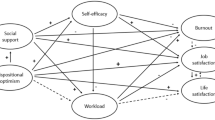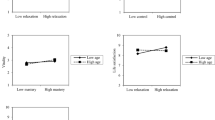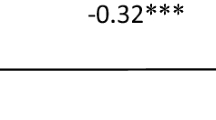Abstract
The present study attempted to investigate the role of time perspectives in language teachers’ burnout and its three dimensions, including emotional exhaustion, depersonalization, and reduced personal accomplishment. For this purpose, a group of 302 English as a foreign language (EFL) teachers were asked to fill out Zimbardo’s Time Perspective Inventory (ZTPI) along with the Maslach Burnout Inventory (MBI). The results of correlations demonstrated significantly positive relationships between burnout, emotional exhaustion, and depersonalization with the past negative and present fatalistic time perspectives (p < .01), and significantly negative ones with past positive, present hedonistic, and future perspectives (p < .01). On the other hand, personal accomplishment had a significantly negative relationship with past negative and present fatalistic (p < .01), and a significantly positive relationship with past positive, present hedonistic, and future perspectives (p < .01). Furthermore, according to what structural equation modeling (SEM) showed, language teachers having a negative outlook on the past and a fatalistic perspective of the future were more likely to experience emotional exhaustion, depersonalization, and burnout in general; whereas those with past positive, present hedonistic, and also future time perspectives were more likely to feel personal accomplishment in their career. Finally, the findings were discussed, and the potential implications were drawn.




Similar content being viewed by others
References
Amini Faskhodi, A., & Siyyari, M. (2018). Dimensions of work engagement and teacher burnout: A study of relations among Iranian EFL teachers. Australian Journal of Teacher Education, 43(1), 78–93. https://doi.org/10.14221/ajte.2018v43n1.5.
Badri Gargari, R. (1995). Psychological syndromes in teacher burnout and coping mechanisms. Tehran: (Unpublished master’s thesis). Tarbiat Modarres University.
Belcastro, P. A., & Gold, R. S. (1983). Teacher stress and burnout: Implications for school health personnel. Journal of School Health, 53(7), 7404–7407. https://doi.org/10.1111/j.1746-1561.1983.tb03148.x.
Bentler, P. M. (1990). Comparative fit indexes in structural models. Psychological Bulletin, 107(2), 238–246.
Bergadaa, M. M. (1990). The role of time in the action of the consumer. The Journal of Consumer Research, 17(3), 289–302.
Bergman, Y. S., & Segel-Karaps, D. (2018). Future time perspective, loneliness, and depressive symptoms among middle-aged adults: A mediation model. Journal of Affective Disorders, 241, 173–175. https://doi.org/10.1016/j.jad.2018.08.019.
Betoret, F. D. (2006). Stressors, self-efficacy, coping resources, and burnout among secondary school teachers in Spain. Educational Psychology, 26(4), 519–539. https://doi.org/10.1080/01443410500342492.
Boyd, J. N., & Zimbardo, P. G. (2005). Time perspective, health, and risk taking. In A. Strathman & J. Joireman (Eds.), Understanding behavior in the context of time: Theory, research, and application (pp. 85–107). Mahwah: Lawrence Erlbaum Associates Publishers.
Brown, J., Jones, S., La Russo, M., & Aber, J. (2010). Improving classroom quality: Teacher influences and experimental impacts of the 4Rs program. Journal of Educational Psychology, 102(1), 153–167. https://doi.org/10.1037/a0018160.
Bryant, F. B., Smart, C. M., & King, S. P. (2005). Using the past to enhance the present: Boosting happiness through positive reminiscence. Journal of Happiness Studies, 6(3), 227–260. https://doi.org/10.1007/s10902-005-3889-4.
Carson, R. L. (2006). Exploring the episodic nature of teachers’ emotions as it relates to teacher burnout. West Lafayette, Indiana: Purdue University.
Chang, M. L. (2009). An appraisal perspective of teacher burnout: Examining the emotional work of teachers. Educational Psychology Review, 21(3), 193–218. https://doi.org/10.1007/s10648-009-9106-y.
Chang, S. J., Van Witteloostuijn, A., & Eden, L. (2010). From the editors: Common method variance in international business research. Journal of International Business Studies, 41(2), 178–184. https://doi.org/10.1057/jibs.2009.88.
Cohen, J. (1992). A power primer. Psychological Bulletin, 112(1), 155–159.
Deci, E. L., & Ryan, R. M. (2000). The “what” and “why” of goal pursuits: Human needs and the self-determination of behavior. Psychological Inquiry, 11(4), 227–268. https://doi.org/10.1207/S15327965PLI1104_01.
Drake, L., Duncan, E., Sutherland, F., Abernethy, C., & Henry, C. (2008). Time perspective and correlates of well-being. Time & Society, 17(1), 47–61. https://doi.org/10.1177/0961463X07086304.
Farrell, T. S. (2007). Reflective language teaching: From research to practice. London: Continuum International Publishing Group.
Folkman, S., Lazarus, R. S., Gruen, R. J., & DeLongis, A. (1986). Appraisal, coping, health status, and psychological symptoms. Journal of Personality and Social Psychology, 50(3), 571–579.
Francis-Smythe, J., & Robertson, I. (1999). Time-related individual differences. Time & Society, 8(2), 273–292. https://doi.org/10.1177/0961463X99008002004.
Freudenberger, H. J. (1974). Staff burn-out. Journal of Social Issues, 30(1), 159–165.
Gastaldi, F. G. M., Pasta, T., Longobardi, C., Prino, E., & Quaglia, R. (2014). Measuring the influence of stress and burnout in teacher-child relationship. European Journal of Education and Psychology, 7(1), 17–28. https://doi.org/10.30552/ejep.v7i1.99.
Grayson, J. L., & Alvarez, H. K. (2006). School climate factors relating to teacher burnout: A mediator model. Teaching and Teacher Education, 24(5), 1349–1363. https://doi.org/10.1016/j.tate.2007.06.005.
Guidetti, G., Viotti, S., Gil-Monte, P. R., & Converso, D. (2018). Feeling guilty or not guilty: Identifying burnout profiles among Italian teachers. Current Psychology, 37(4), 769–780. https://doi.org/10.1007/s12144-016-9556-6.
Guiora, A. Z. (1983). The dialectic of language acquisition. Language Learning, 33(s5), 3–12.
Gupta, R., Hershey, D. A., & Gaur, J. (2012). Time perspective and procrastination in the workplace: An empirical investigation. Current Psychology, 31(2), 195–211. https://doi.org/10.1007/s12144-012-9136-3.
Hair, J. F., Black, W. C., Babin, B. J., Anderson, R. E., & Tatham, R. L. (2006). Multivariate data analysis (Vol. 6). Upper Saddle River: Pearson Prentice Hall.
Hakanen, J. J., Bakker, A. B., & Schaufeli, W. B. (2006). Burnout and work engagement among teachers. Journal of School Psychology, 43(6), 495–513. https://doi.org/10.1016/j.jsp.2005.11.001.
Harber, K. D., Zimbardo, P. G., & Boyd, J. N. (2003). Participant self-selection biases as function of individual differences in time perspective. Basic and Applied Social Psychology, 25(3), 255–264. https://doi.org/10.1207/S15324834BASP2503_08.
Harman, H. (1976). Modern factor analysis. Chicago: University of Chicago Press.
Herman, K. C., Hickmon-Rosa, J. E., & Reinke, W. M. (2018). Empirically derived profiles of teacher stress, burnout, self-efficacy, and coping and associated student outcomes. Journal of Positive Behavior Interventions, 20(2), 90–100. https://doi.org/10.1177/1098300717732066.
Holland, R. P. (1982). Special educator burnout. Educational Horizons, 60(2), 58–64.
Hu, L. T., & Bentler, P. M. (1999). Cutoff criteria for fit indexes in covariance structure analysis: Conventional criteria versus new alternatives. Structural Equation Modeling, 6(1), 1–55. https://doi.org/10.1080/10705519909540118.
Iancu, A. E., Rusu, A., Măroiu, C., Păcurar, R., & Maricuţoiu, L. P. (2018). The effectiveness of interventions aimed at reducing teacher burnout: A meta-analysis. Educational Psychology Review, 30(2), 373–396. https://doi.org/10.1007/s10648-017-9420-8.
Janeiro, I. N., Duarte, A. M., Araujo, A. M., & Gomez, A. I. (2017). Time perspective, approaches to learning, and academic achievement in secondary students. Learning and Individual Differences, 55, 61–68. https://doi.org/10.1016/j.lindif.2017.03.007.
Keller, M. M., Chang, M.-L., Becker, E. S., Goetz, T., & Frenzel, A. C. (2014). Teachers’ emotional experiences and exhaustion as predictors of emotional labor in the classroom: An experience sampling study. Frontiers in Psychology, 1442(5), 1–10. https://doi.org/10.3389/fpsyg.2014.01442.
Khajavy, G. H., Ghonsooly, B., & Fatemi, A. H. (2017). Testing a burnout model based on affective-motivational factors among EFL teachers. Current Psychology, 36(2), 339–349. https://doi.org/10.1007/s12144-016-9423-5.
Kline, R. B. (2015). Principles and practice of structural equation modeling (4th ed.). New York: The Guilford Press.
Kokkinos, C. M. (2007). Job stressors, personality and burnout in primary school teachers. British Journal of Educational Psychology, 77(1), 229–243. https://doi.org/10.1348/000709905X90344.
Kulavuz-Onal, D., & Tatar, S. (2017). Teacher burnout and participation in professional learning activities: Perspectives from university English language instructors in Turkey. Journal of Language and Linguistic Studies, 13(1), 283–303.
Lau, S. Y. (2002). Teacher burnout in Hong Kong secondary schools (unpublished doctoral dissertation). Hong Kong, China: The Chinese University of Hong Kong.
Levine, R. (1997). A geography of time: The temporal misadventures of a social psychologist. New York: Basic Books.
Magnano, P., Santisi, G., & Platania, S. (2017). Emotional intelligence as mediator between burnout and organisational outcomes. International Journal of Work Organisation and Emotion, 8(4), 305–320. https://doi.org/10.1504/IJWOE.2017.089295.
Maslach, C. (1986). Burnout research in the social services: A critique. Journal of Social Service Research, 10, 95–105. https://doi.org/10.1300/J079v10n01_09.
Maslach, C., & Jackson, S. E. (1981). Maslach burnout inventory research edition manual. Palo Alto: Consulting Psychologists Press.
Maslach, C., & Leiter, M. P. (1997). The truth about burnout: How organizations cause personal stress and what to do about it. San Francisco.
Jossey-Bass Maslach, C., & Schaufeli, W. B. (2017). Historical and conceptual development of burnout. In W. B. Schaufeli, C. Maslach, & T. Marek (Eds.), Professional burnout: Recent developments in theory and research (pp. 1–18). New York: Routledge.
Maslach, C., Jackson, S. E., & Leiter, M. P. (1996). The Maslach burnout inventory (3rd ed.). Palo Alto: Consulting Psychologists Press.
Maslach, C., Leiter, M. P., & Schaufeli, W. B. (2008). Measuring burnout. In C. L. Cooper & S. Cartwright (Eds.), The Oxford handbook of organizational well-being (pp. 86–108). Oxford: Oxford University.
Maslach, C., Schaufeli, W. B., & Leiter, M. P. (2001). Job burn-out. Annual Review of Psychology, 52, 397–422. https://doi.org/10.1146/annurev.psych.52.1.397.
Montgomery, C., & Rupp, A. (2005). A meta-analysis for exploring the diverse causes and effects of stress in teachers. Canadian Journal of Education, 28(3), 461–488. https://doi.org/10.2307/4126479.
Naji Meidani, E., Pishghadam, R., Ghonsooly, B., & Hosseini Fatemi, A. (2018). Constructing and validating a language teachers’ temporal intelligence scale and examining its relationship with teacher burnout. Innovation in Language Learning and Teaching., 1–16. https://doi.org/10.1080/17501229.2018.1488854.
Onwezen, M. C., Van't Riet, J., Dagevos, H., Sijtsema, S. J., & Snoek, H. M. (2016). Snacking now or later? Individual differences in following intentions or habits explained by time perspective. Appetite, 107, 144–151. https://doi.org/10.1016/j.appet.2016.07.031.
Orosz, G., Dombi, E., Toth-Kiraly, I., Bothe, B., Jagodics, B., & Zimbardo, P. G. (2016). Academic cheating and the present: Cheaters live in the present instead of the future. Learning and Individual Differences, 52, 39–45. https://doi.org/10.1016/j.lindif.2016.10.007.
Peeters, M. A., & Rutte, C. G. (2005). Time management behavior as a moderator for the job demand-control interaction. Journal of Occupational Health Psychology, 10(1), 64–75.
Piechurska-Kuciel, E. (2011). Foreign language teacher burnout: A research proposal. In M. Pawlak (Ed.), Extending the boundaries of research on second language learning and teaching (pp. 211–223). Heidelberg: Springer.
Pishghadam, R., Adamson, B., & Shayesteh, S. (2013). Emotion-based language instruction (EBLI) as a new perspective in bilingual education. Multilingual Education, 3(9), 1–16. https://doi.org/10.1186/2191-5059-3-9.
Pishghadam, R., Jajarmi, H., & Shayesteh, S. (2016). Conceptualizing sensory relativism in light of emotioncy: A movement beyond linguistic relativism. International Journal of Society, Culture & Language, 4(2), 11–21.
Pishghadam, R., & Sahebjam, S. (2012). Personality and emotional intelligence in teacher burnout. The Spanish Journal of Psychology, 15(1), 227–236. https://doi.org/10.5209/rev_SJOP.2012.v15.n1.37314.
Podsakoff, P. M., MacKenzie, S. B., Lee, J. Y., & Podsakoff, N. P. (2003). Common method biases in behavioral research: A critical review of the literature and recommended remedies. Journal of Applied Psychology, 88, 879–903. https://doi.org/10.1037/0021-9010.88.5.879.
Przepiorka, A., & Blachnio, A. (2016). Time perspective in internet and Facebook addiction. Computers in Human Behavior, 60, 13–18. https://doi.org/10.1016/j.chb.2016.02.045.
Sadeghi, K., & Khezrlou, S. (2016). The experience of burnout among English language teachers in Iran: Self and other determinants. Teacher Development: An International Journal of Teachers' Professional Development, 20(5), 631–647. https://doi.org/10.1080/13664530.2016.1185028.
Schaufeli, W. B., & Enzmann, D. (1998). The burnout companion to study and practice: A critical analysis. London: Taylor & Francis.
Schwarzer, R., Schmitz, G. S., & Tang, C. (2000). Teacher burnout in Hong Kong and Germany: A cross-cultural validation of the Maslach burnout inventory. Anxiety, Stress & Coping, 13(3), 309–326. https://doi.org/10.1080/10615800008549268.
Sekscinska, K., Rudzinska-Wojciechowska, J., & Maison, D. (2018). Individual differences in time perspectives and risky financial choices. Personality and Individual Differences, 120, 118–126. https://doi.org/10.1016/j.paid.2017.08.038.
Skaalvik, E. M., & Skaalvik, S. (2009). Does school context matter? Relations with teacher burnout and job satisfaction. Teaching and Teacher Education, 25(3), 518–524.
Skaalvik, E. M., & Skaalvik, S. (2017). Dimensions of teacher burnout: Relations with potential stressors at school. Social Psychology of Education, 20(4), 775–790. https://doi.org/10.1007/s11218-017-9391-0.
Stolarski, M., Bitner, J., & Zimbardo, P. G. (2011). Time perspective, emotional intelligence discounting of delayed awards. Time and Society, 20(3), 346–363. https://doi.org/10.1177/0961463X11414296.
Stolarski, M., Matthews, G., Postek, S., Zimbardo, P. G., & Bitner, J. (2014). How we feel is a matter of time: Relationships between time perspectives and mood. Journal of Happiness Studies, 15, 809–927. https://doi.org/10.1007/s10902-013-9450-y.
Stolarski, M., Wojtkowska, K., & Kwiecinska, M. (2016). Time for love: Partners' time perspectives predict relationship satisfaction in romantic heterosexual couples. Time & Society, 25(3), 552–574. https://doi.org/10.1177/0961463X15596703.
Travers, C. J., & Cooper, C. L. (1996). Teacher under pressure: Stress in the teaching profession. London: Routledge.
van Droogenbroeck, F., & Spruyt, B. (2015). Do teachers have worse mental health? Review of the existing comparative research and results from the Belgian health interview survey. Teaching and Teacher Education, 51, 88–100. https://doi.org/10.1016/j.tate.2015.06.006.
Viotti, S., Guidetti, G., Loera, B., Martini, M., Sottimano, I., & Converso, D. (2016). Stress, work ability, and an aging workforce: A study among women aged 50 and over. International Journal of Stress Management, 24(1), 98–121.
Zajenkowski, M., Stolarski, M., Witowska, J., Maciantowicz, O., & Łowicki, P. (2016). Fluid intelligence as a mediator of the relationship between executive control and balanced time perspective. Frontiers in Psychology, 7, 1–7. https://doi.org/10.3389/Ffpsyg.2016.01844.
Zhang, J. W., & Howell, R. T. (2011). Do time perspectives predict unique variance in life satisfaction beyond personality traits? Personality and Individual Differences, 50, 1261–1266. https://doi.org/10.1016/j.paid.2011.02.021.
Zhang, J. W., Howell, R. T., & Stolarski, M. (2013). Comparing three methods to measure balanced time perspective: The relationship between a balanced time perspective and subjective well-being. Journal of Happiness Studies, 14(1), 169–184. https://doi.org/10.1007/s10902-012-9322-x.
Zimbardo, P. G., & Boyd, J. N. (1999). Putting time in perspective: A valid, reliable individual differences metric. Journal of Personality and Social Psychology, 77(6), 1271–1288. https://doi.org/10.1007/978-3-319-07368-2_2.
Zimbardo, P. G., & Boyd, J. (2008). The time paradox: The new psychology of time that can change your life. New York: Free Press.
Zimbardo, P. G., & Boyd, J. N. (2015). Putting time in perspective: A valid, reliable individual differences metric. In M. Stolarski et al. (Eds.), Time perspective theory; review, research and application: Essays in honor of Philip G. Zimbardo (pp. 17–55). Switzerland: Springer International Publishing.
Zimbardo, P. G., Keough, K. A., & Boyd, J. N. (1997). Present time perspective as a predictor of risky driving. Personality and Individual Differences, 23(6), 1007–1023. https://doi.org/10.1016/S0191-8869(97)00113-X.
Acknowledgements
The authors wish to express their sincere gratitude to the editor and anonymous reviewers of this manuscript who assisted us to fine-tune the paper. Our thanks also go to the participants who took part in this study.
Author information
Authors and Affiliations
Corresponding author
Ethics declarations
Ethical Approval
All procedures performed in the study were in accordance with the ethical standards of the institutional and/or national research committee and with the 1964 Helsinki declaration and its later amendments or comparable ethical standards.
Conflict of Interest
The authors declare that they have no conflict of interest.
Additional information
Publisher’s Note
Springer Nature remains neutral with regard to jurisdictional claims in published maps and institutional affiliations.
Appendix 1
Appendix 1
Appendix A: Sample items of ZTPI
Past negative:
I often think of what I should have done differently in my life.
Past positive:
It gives me pleasure to think about my past.
Present hedonistic:
I try to live my life as fully as possible, one day at a time.
Present fatalistic:
My life path is controlled by forces I cannot influence.
Future:
I believe that a person’s day should be planned ahead each morning.
Appendix B: Sample items of the MBI
Emotional exhaustion.
I feel emotionally drained from my work.
Depersonalization
I do not really care what happens to some students.
Personal accomplishment.
I deal very effectively with the problems of my students.
Rights and permissions
About this article
Cite this article
Meidani, E.N., Pishghadam, R. & Shakeebaee, G. The role of time perspectives in Language Teachers’ Burnout. Curr Psychol 40, 5145–5155 (2021). https://doi.org/10.1007/s12144-019-00456-x
Published:
Issue Date:
DOI: https://doi.org/10.1007/s12144-019-00456-x




